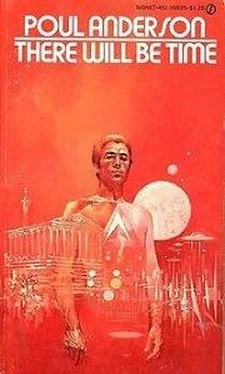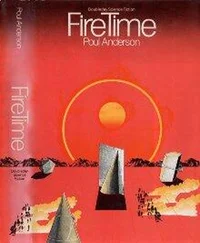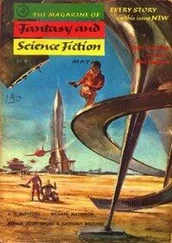Poul Anderson - There Will Be Time
Здесь есть возможность читать онлайн «Poul Anderson - There Will Be Time» весь текст электронной книги совершенно бесплатно (целиком полную версию без сокращений). В некоторых случаях можно слушать аудио, скачать через торрент в формате fb2 и присутствует краткое содержание. Год выпуска: 1972, Издательство: Doubleday, Жанр: Фантастика и фэнтези, на английском языке. Описание произведения, (предисловие) а так же отзывы посетителей доступны на портале библиотеки ЛибКат.
- Название:There Will Be Time
- Автор:
- Издательство:Doubleday
- Жанр:
- Год:1972
- ISBN:нет данных
- Рейтинг книги:5 / 5. Голосов: 1
-
Избранное:Добавить в избранное
- Отзывы:
-
Ваша оценка:
- 100
- 1
- 2
- 3
- 4
- 5
There Will Be Time: краткое содержание, описание и аннотация
Предлагаем к чтению аннотацию, описание, краткое содержание или предисловие (зависит от того, что написал сам автор книги «There Will Be Time»). Если вы не нашли необходимую информацию о книге — напишите в комментариях, мы постараемся отыскать её.
Nominated for Hugo Award for Best Novel in 1973.
There Will Be Time — читать онлайн бесплатно полную книгу (весь текст) целиком
Ниже представлен текст книги, разбитый по страницам. Система сохранения места последней прочитанной страницы, позволяет с удобством читать онлайн бесплатно книгу «There Will Be Time», без необходимости каждый раз заново искать на чём Вы остановились. Поставьте закладку, и сможете в любой момент перейти на страницу, на которой закончили чтение.
Интервал:
Закладка:
“Hard men, you two,” Moriarty laughed. “Real hard, hey?”
The sequence had taken seconds. Havig’s call had again failed to pierce their excitement. Mendoza was first to see him, and exclaim. The rest froze, until Coenraad let Xenia go and climbed to his feet.
She stared up. Never had he thought to see such a light as was born in her eyes. “Hauk!” She cried. “Oh, Hauk!”
Mendoza swung his gun around. “What is this?” he demanded.
Havig realized how far his own hand was from his own weapon. But he felt no fear — hardly any emotion, in fact, on the surface, beyond a cougar alertness. Down underneath roiled the fury, sorrow, horror, disgust he could not now afford.
“I might ask you the same,” he replied slowly.
“Have you forgotten your orders? I know them. Your job is to gather intelligence. You are not to risk yourself at a scene of operations like this.”
“I finished my job, Mendoza. I came back for a personal look.”
“Forbidden! Get out, and we’ll talk later about whether or not I report you.”
“Suppose I don’t?” Despite control, Havig heard his voice rise, high and saw-edged: “I’ve seen what I wasn’t supposed to see in one lump, only piece by piece, gradually, so I’d make the dirty little compromises till it no longer mattered, I’d be in so deep that I’d either have to kill myself or become like you. Yes, I understand.”
Mendoza’s shrug did not move the tommygun barrel aimed at Havig’s stomach. “Well? What do you expect? We use what human material we can find. These boys are no worse than the Crusaders — than man in most of history. Are they, Jack? Be honest.”
“They are. Because they have the power to come into any time, any place, do anything, and never fear revenge. How do they spend their holidays, I wonder? I imagine the taste for giving pain and death must grow with practice.”
“Listen—”
“And Wallis, his whole damned outfit, doesn’t even try to control them!”
“Havig, you talk too much. Get out before I arrest you.”
“They keep the few like me from knowing, till we’ve accepted that crock — about how the mission of the Eyrie is too important for us to waste lifespan on enforcing common humanity. Right?”
Mendoza spat. “Hokay, boy, you said plenty and then some. You’re under arrest. You’ll be escorted uptime and the Sachem will judge your case. Be good and maybe you’ll get off easy.”
For a moment it was tableau, very quiet save for Xenia’s sobs where she cradled the head of her half-conscious mother. Her eyes never left Havig. Nor did those of the household he had known — hopeful young Bardas, gifted Ioannes, old Maria who had been Xenia’s nurse, all and all of the dozen — nor those of Mendoza and Moriarty. Hans’s kept flickering in animal wariness, Coenraad’s in thwarted lechery.
Havig reached his decision, made his plan, noted the position of each man and weapon, in that single hard-held breath.
Himself appeared, six-fold throughout the room. The fire-fight exploded.
He cast himself back in time a few minutes while sidestepping, sped uptime while he drew his pistol, emerged by Hans. The gun cracked and kicked. The Landsknecht’s head geysered into pieces. Havig went back again, and across the chamber.
Afterward he scarcely remembered what happened. The battle was too short, too ferocious. Others could do what he did, against him. Coenraad wasn’t quick-witted enough, and died. Moriarty vanished from Havig’s sight as the latter arrived. Mendoza’s gun blasted, and Havig sprang future-ward barely in time. Traveling, he saw Moriarty’s shadow form appear. He backtracked, was there at the instant, shot the man and twisted off into time, away from Mendoza.
Then the Mexican wasn’t present. Havig slipped pastward — a night when the family slept at peace under God — to gasp air and let the sweat stop spurting, the limbs stop shaking. At last he felt able to return and scan the period of combat in detail. Beyond a certain point, not long after the beginning, he found no Mendoza.
The fellow must have gone way uptime, maybe to the far side of the Judgment, for help.
This meant fast action was vital. Havig’s friends could not time-hop. The enemy would be, no, were handicapped by the difficulty of reaching a precise goal without a chronolog. But they could cast around, and wouldn’t miss by much.
Havig rejoined Earth at the earliest possible second. Moriarty threshed about, yammering anguish, like those men outside whom he, perhaps, had been the one to shoot. Never mind him. The Byzantines huddled together. Bardas lay dead, two others wounded in crossfire.
“I come to save you,” Havig said into the reek of powder and fear, into their uncomprehending glazed-eye shock. He drew the sign of the cross, right to left in Orthodox style. “In the name of the Father, and of the Son, and of the Holy Ghost. In the name of the Virgin Mary and every saint. Come with me, at once, or you die.”
He helped Xenia rise. She clung to him, face buried against his breast, fingers clutching. He rumpled the long black hair and remembered how he a child would grasp at a father bound for death. Across her shoulder he snapped: “Ioannes, Nicephorus, you look in the best shape. Carry your lady Anna. The rest of you who’re hale, give aid to the hurt.” English broke from him: “Goddammit, we’ve got to get out of here!”
Numbly, they obeyed. In the street he stopped to don the surcoat off a dead Crusader. His pack he gave a man to carry. From another corpse he took a sword. He didn’t waste time unbuckling the scabbard belt. That weapon indicated a high enough rank that his party wasn’t likely to meet interference.
Several streets down, dizziness overwhelmed him. He must sit, head between knees, till strength returned. Xenia knelt before him, hands anxiously trying to help. “Hauk,” went her raw whisper. “Wh-wh-what’s wrong, dearest Hauk?”
“We’re safe,” he finally said.
From the immediate threat, at least. He didn’t suppose the Eyrie would spend man-years scouring Constantinople for him and these, once they had vanished into the multitudes. But he had still to safeguard their tomorrows, and his own. The knowledge gave him a glacial kind of resolution. He rose and led them further on their stumbling way.
“I left them at a certain monastery,” he told me (long afterward on his own world line). “The place was jammed with refugees, but I foreknew it’d escape attention. In the course of the next several days, local time, I made better arrangements. A simple task—” he grimaced—”distasteful but simple, to hijack unidentifiable loot from ordinary Franks. I made presents to that monastery, and to the nunnery where I later took the women. This won favor for the people I’d brought, special favor out of the hordes, because with my donations the monks and nuns could buy bread to feed their poor.”
“What about the hordes?” I asked softly.
He covered his face. “What could I do? They were too many.”
I gripped his shoulder. “They are always too many, Jack.”
He sighed and smiled a little. “Thanks, Doc.”
I had exceeded my day’s tobacco ration, but the hour was far into night and my nerves required some help. Drawing out my pipe, I made an evil-smelling ceremony of cleaning it. “What’d you do next?”
“Went back to the twentieth century — a different hotel — and slept a lot,” he said. “Afterward … well, as for my Byzantines, I could do nothing in their immediate futures. I’d cautioned them against talking, told them to say they’d just fled from a raid. After a ‘saint’ had rescued them from ‘demons,’ it was a safe bet they’d obey. But as fail-safe, I did not tell the men where I led the women.
Читать дальшеИнтервал:
Закладка:
Похожие книги на «There Will Be Time»
Представляем Вашему вниманию похожие книги на «There Will Be Time» списком для выбора. Мы отобрали схожую по названию и смыслу литературу в надежде предоставить читателям больше вариантов отыскать новые, интересные, ещё непрочитанные произведения.
Обсуждение, отзывы о книге «There Will Be Time» и просто собственные мнения читателей. Оставьте ваши комментарии, напишите, что Вы думаете о произведении, его смысле или главных героях. Укажите что конкретно понравилось, а что нет, и почему Вы так считаете.












